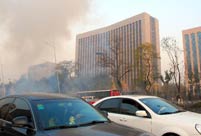NEW DELHI, Nov. 12 -- The foreign ministers of China, Russia and India on Sunday condemned in the strongest terms a terrorist attack in Beijing last month and conveyed condolences and sympathy to the typhoon-hit Philippines.
The ministers reiterated that terrorism is a threat to international peace and security and a grave violation of human rights and a crime against humanity, according to a joint communique released after their 12th meeting.
They condemned terrorism in all its forms and manifestations, committed by whomever, wherever, and for whatever purposes, it said.
The ministers affirmed the need for all states to join efforts in combating terrorism under the auspices of the United Nations, based on the UN Charter, the relevant UN Security Council (UNSC) resolutions, the Global Counter-Terrorism Strategy and relevant principles and norms of international law, it said.
They agreed that there can not be ideological, religious, political, racial, ethnic, or any other justification for acts of terrorism, and underlined the need to bring to justice perpetrators, organizers, financiers and sponsors of terrorist acts, said the joint communique.
To the Philippines that was hit by Typhoon Haiyan last week, the three ministers expressed their condolences and sympathy to the people and the government of the Philippines for the loss of lives.
Typhoon Haiyan is the strongest tropical cyclone so far this year and one of the most intense on record, said the World Meteorological Organization (WMO). Philippine officials said that the typhoon had left 1,774 people dead and many others missing or injured in the country.
During the meeting of the three top diplomats here on Sunday, Afghanistan was a big common concern of the three parties.
The ministers held the view that the evolving situation in Afghanistan is closely linked with security of the region.
The ministers expressed deep concern over the continuing situation in Afghanistan and acknowledged that the main threat to Afghanistan's security, stability and prosperity is terrorism, radicalism and violent extremism.
They stressed the importance of the international community remaining engaged in Afghanistan and fulfilling its commitments on civilian and security assistance during the period of transition and through the decade of transformation in Afghanistan.
The three ministers stressed the core coordinating role of the UN in promoting peace and stability in Afghanistan.
They were also worried about the scale of illicit drug production and trafficking in Afghanistan, and underlined that revenue from drug trafficking is one of the main sources of financing terrorist organizations.
The ministers emphasized the urgent need for the international community to counteract illicit production and trafficking of drugs of Afghan origin in line with the provisions of the Paris Pact and the SCO Anti-Drug Strategy.
As for the latest developments in the Middle East, the ministers welcomed the adoption of UNSC resolution, which endorsed the Organization for the Prohibition of Chemical Weapons (OPCW) Executive Council decision calling on Syria to comply with all aspects of the OPCW decision.
They further welcomed the framework agreement reached between Russia and the United States on the time-bound safeguarding and destruction of Syria's chemical weapons stockpiles and also the recent steps taken by Syria to accede to the Chemical Weapons Convention.
The ministers called for early convening of the International Conference on Syria (Geneva-II), to take forward the Geneva-I Communique adopted on June 30, 2012, which will bring all Syrian parties to the conflict to the negotiating table.
They reaffirmed that the Israeli-Palestinian conflict remains an urgent and key issue for the international community, the resolution of which is a prerequisite for building a sustainable and lasting peace in the Middle East region.
They also discussed the evolving situation in Egypt, wishing Egypt to promote national reconciliation as soon as possible to continue to play that role, contributing to peace and prosperity in the region.
The ministers called for the early resolution of the Iranian nuclear issue through political and diplomatic means on the basis of a step-by-step approach and reciprocity to restore international confidence in the peaceful nature of Iran's nuclear program.
They recognized Iran's right to peaceful use of nuclear energy, including for uranium enrichment under strict IAEA safeguards and consistent with its international obligations.
Chinese, Russian and Indian foreign ministers reiterated the UN as the foremost multilateral forum entrusted with bringing about hope, peace and sustainable development to the world.
They expressed strong commitment to multilateral diplomacy with the United Nations playing the leading role in dealing with global challenges and threats.
The ministers reiterated the importance attached by their countries to cooperation within BRICS.
In this context, they reaffirmed their determination to work together to further strengthen BRICS as a mechanism for consultation, coordination and cooperation on global and regional political and economic issues of mutual interest.
The foreign ministers of China and Russia supported India's active engagement with and positive contributions to the Shanghai Cooperation Organization.
The ministers noted the rising role of the Asia-Pacific region in international affairs and supported regional integration and cooperation.
The ministers recognized the important role played by the Asia-Pacific Economic Cooperation (APEC) towards creating conducive environment for promoting trade and investment as well as regional integration in the Asia-Pacific region.
Regarding the vulnerable world economic growth, the ministers underlined the need to boost multilateral cooperation in order to tackle these challenges.
The ministers welcomed the outcomes of the G20 Saint Petersburg Summit held under the Russian Presidency.
They stressed that the continuous implementation of its recommendations with respect to the decisions aimed at accelerating world economic growth, midterm fiscal consolidation, higher employment, building an open world economy and promoting development will facilitate the resolution of the key global economic issues.
The mechanism of the China-Russia-India foreign ministers' meeting was initiated in 2002. The trilateral format has become a platform to foster closer dialogue and practical cooperation in identified areas among the three countries.
 Luxury-cars parade held in Dubai
Luxury-cars parade held in Dubai Special forces take tough training sessions
Special forces take tough training sessions Fire guts 22-storey Nigeria commercial building in Lagos
Fire guts 22-storey Nigeria commercial building in Lagos A girl takes care of paralyzed father for 10 years
A girl takes care of paralyzed father for 10 years A record of Beijing air quality change
A record of Beijing air quality change In pictures: explosions occur in Taiyuan
In pictures: explosions occur in Taiyuan Live a harmonious life in Pu'er, SW China
Live a harmonious life in Pu'er, SW China Weekly Sports Photos
Weekly Sports Photos Gingko leaves turn brilliant golden yellow in Beijing
Gingko leaves turn brilliant golden yellow in Beijing Maritime counter-terrorism drill
Maritime counter-terrorism drill Loyal dog waits for master for six months
Loyal dog waits for master for six months The catwalk to the world of fashion
The catwalk to the world of fashion  China in autumn: Kingdom of red and golden
China in autumn: Kingdom of red and golden National Geographic Traveler Photo Contest
National Geographic Traveler Photo Contest Living in an urban village: 'Iron-digger' Xiong Sansan
Living in an urban village: 'Iron-digger' Xiong SansanDay|Week|Month